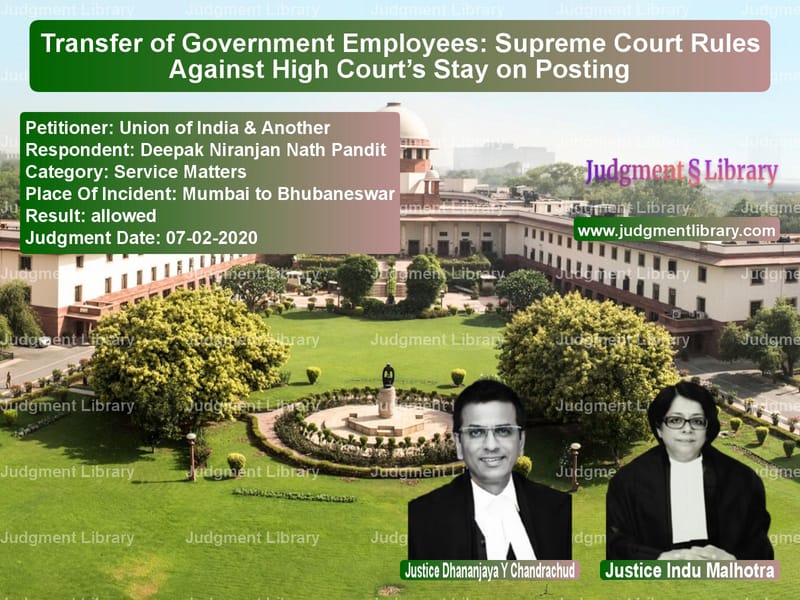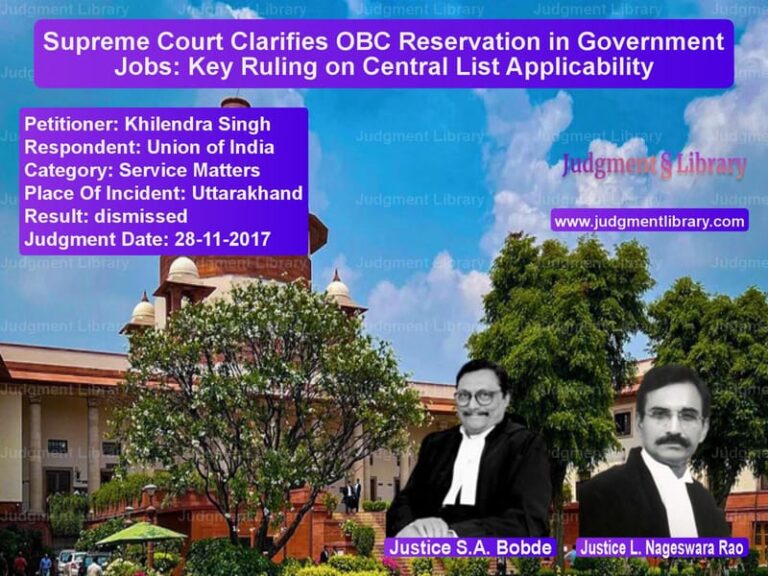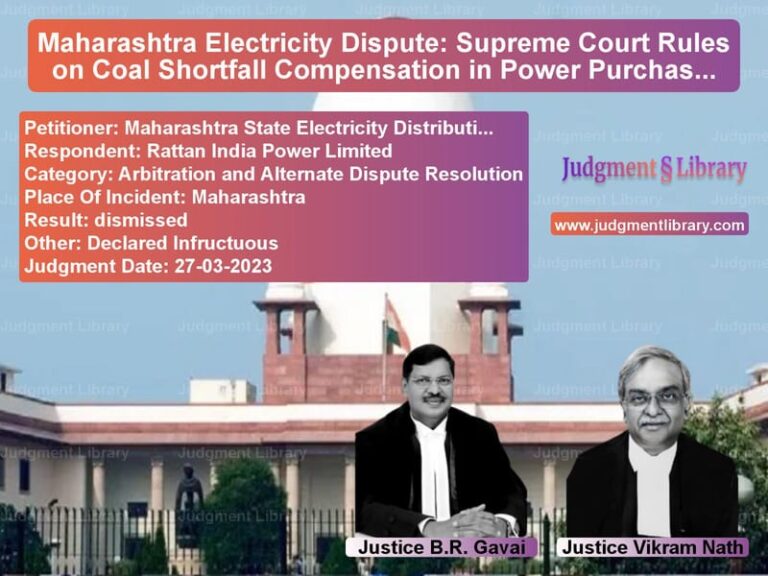Transfer of Government Employees: Supreme Court Rules Against High Court’s Stay on Posting
The Supreme Court of India, in its judgment dated 07 February 2020, ruled on a significant case concerning the transfer of a government employee, reinforcing the legal principles governing administrative transfers. The case involved an Assistant Commissioner of Customs, GST, and Central Excise, Deepak Niranjan Nath Pandit, who was transferred from Mumbai to Bhubaneswar but contested the transfer in court.
Background of the Case
The respondent, Deepak Niranjan Nath Pandit, was transferred from Mumbai to Bhubaneswar by the Government of India’s Ministry of Finance (Central Board of Indirect Taxes and Customs) through an order issued on 05 September 2019. The respondent challenged this order before the Central Administrative Tribunal (CAT), which initially granted an ad interim stay on 17 September 2019. However, after hearing the matter, CAT dismissed the challenge on 05 November 2019.
Unwilling to accept the CAT’s decision, the respondent approached the High Court of Bombay. The High Court, at the production stage, continued the stay order on 11 November 2019 and later, on 02 December 2019, admitted the petition, maintaining the stay on the transfer.
The Union of India challenged this decision before the Supreme Court, arguing that the High Court had improperly interfered with the government’s administrative function.
Arguments of the Parties
Petitioner (Union of India) Argued:
- The respondent was a government employee with a transferable job, and the transfer order was issued in compliance with standard administrative policies.
- The High Court’s interference was unjustified, as it did not find any prima facie evidence of mala fide intent or violation of legal provisions in the transfer order.
- Administrative transfers are necessary for effective governance, and courts should not interfere in routine transfers unless there are exceptional circumstances.
- The respondent had not joined his new posting despite the CAT ruling against him.
Respondent (Deepak Niranjan Nath Pandit) Argued:
- The High Court’s stay was justified because his headquarters would remain in Mumbai even if he were suspended, thus making the transfer unnecessary.
- His spouse had a serious cardiac condition and was undergoing medical treatment in Mumbai, making the transfer an undue hardship.
- The government had, during previous hearings, expressed willingness to post him in three alternative locations instead of Bhubaneswar, indicating flexibility in the matter.
Supreme Court’s Analysis and Observations
1. Validity of Administrative Transfers
The Supreme Court reaffirmed the principle that government employees holding transferable positions cannot insist on being posted at a location of their choice. The Court observed:
“There is no lawful reason for the respondent to cling on to a posting at Mumbai. He cannot claim a posting as of right to a place of his choice.”
The Court noted that transfer orders, unless shown to be issued with mala fide intent or in violation of statutory rules, should not be subject to judicial interference.
2. Personal Hardship Cannot Override Administrative Needs
Addressing the respondent’s argument regarding his spouse’s medical condition, the Court clarified that personal hardships should be assessed by the employer, not the courts. It stated:
“Individual hardships are matters for the Union of India, as an employer, to take a dispassionate view.”
The Court held that the High Court erred in granting relief based solely on personal hardship, as such factors do not render a transfer order illegal.
3. High Court’s Improper Exercise of Judicial Power
The Supreme Court strongly criticized the High Court’s decision to interfere with the transfer order without finding any legal or procedural flaws. It noted:
“The High Court could not have dictated to the employer as to where the respondent should be posted during the period of suspension.”
The Court further stated:
“The manner in which judicial power has been exercised by the High Court to stall a lawful order of transfer is disquieting. We express our disapproval.”
By setting aside the High Court’s order, the Supreme Court reinforced that courts should refrain from interfering in routine administrative matters unless there is a clear legal violation.
Final Judgment
The Supreme Court ruled in favor of the Union of India and set aside the High Court’s order. It directed:
- The respondent must report to Bhubaneswar within one week.
- If the respondent joins his new posting, he may submit a representation to the government regarding his transfer.
- The Supreme Court made no observations on the merits of such a representation, leaving it to the government’s discretion.
Conclusion
This judgment reinforces key principles governing administrative transfers in government service. The Supreme Court’s ruling highlights:
- Government employees in transferable posts cannot insist on being posted at a preferred location.
- Courts should not interfere in transfer orders unless there is prima facie evidence of mala fide intent or legal violations.
- Personal hardships should be addressed by the employer, not the judiciary.
- High Courts must exercise restraint in granting stays on transfer orders without substantive legal grounds.
By setting aside the High Court’s stay and reaffirming the importance of administrative efficiency, the Supreme Court ensured that judicial intervention does not disrupt government functioning without valid legal reasons.
Petitioner Name: Union of India & Another.Respondent Name: Deepak Niranjan Nath Pandit.Judgment By: Justice Dhananjaya Y Chandrachud, Justice Indu Malhotra.Place Of Incident: Mumbai to Bhubaneswar.Judgment Date: 07-02-2020.
Don’t miss out on the full details! Download the complete judgment in PDF format below and gain valuable insights instantly!
Download Judgment: Union of India & Ano vs Deepak Niranjan Nath Supreme Court of India Judgment Dated 07-02-2020.pdf
Direct Downlaod Judgment: Direct downlaod this Judgment
See all petitions in Transfers Cases
See all petitions in Public Sector Employees
See all petitions in Judgment by Dhananjaya Y Chandrachud
See all petitions in Judgment by Indu Malhotra
See all petitions in allowed
See all petitions in supreme court of India judgments February 2020
See all petitions in 2020 judgments
See all posts in Service Matters Category
See all allowed petitions in Service Matters Category
See all Dismissed petitions in Service Matters Category
See all partially allowed petitions in Service Matters Category







